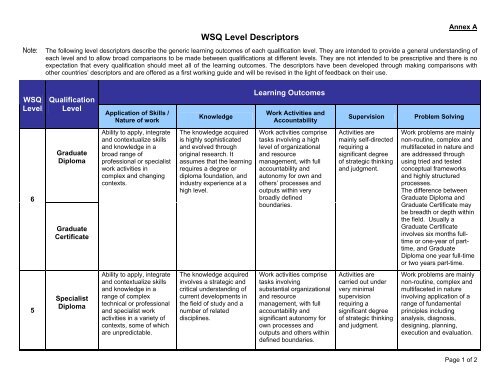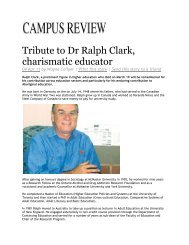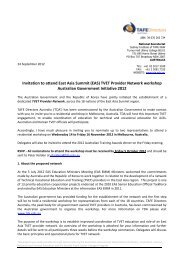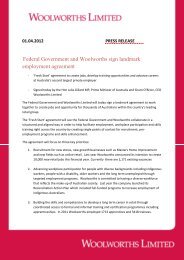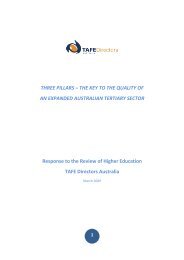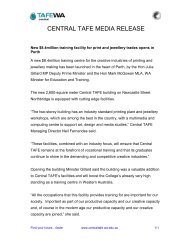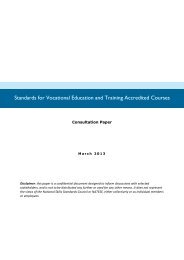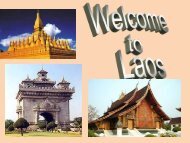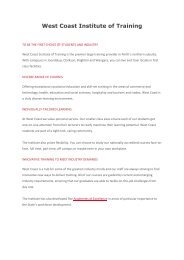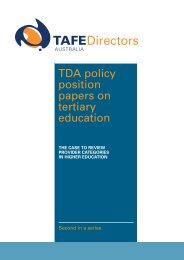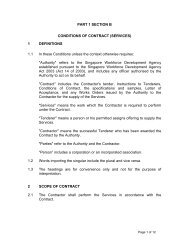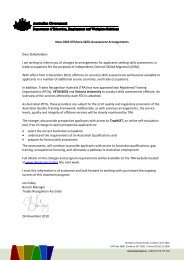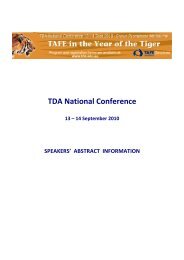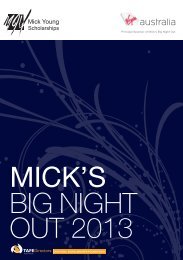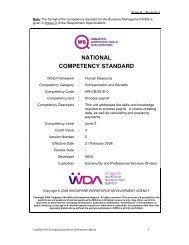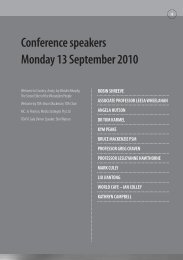WSQ Level Descriptors
WSQ Level Descriptors
WSQ Level Descriptors
You also want an ePaper? Increase the reach of your titles
YUMPU automatically turns print PDFs into web optimized ePapers that Google loves.
<strong>WSQ</strong> <strong>Level</strong> <strong>Descriptors</strong><br />
Annex A<br />
Note: The following level descriptors describe the generic learning outcomes of each qualification level. They are intended to provide a general understanding of<br />
each level and to allow broad comparisons to be made between qualifications at different levels. They are not intended to be prescriptive and there is no<br />
expectation that every qualification should meet all of the learning outcomes. The descriptors have been developed through making comparisons with<br />
other countries’ descriptors and are offered as a first working guide and will be revised in the light of feedback on their use.<br />
<strong>WSQ</strong><br />
<strong>Level</strong><br />
Qualification<br />
<strong>Level</strong><br />
Application of Skills /<br />
Nature of work<br />
Knowledge<br />
Learning Outcomes<br />
Work Activities and<br />
Accountability<br />
Supervision<br />
Problem Solving<br />
6<br />
Graduate<br />
Diploma<br />
Graduate<br />
Certificate<br />
Ability to apply, integrate<br />
and contextualize skills<br />
and knowledge in a<br />
broad range of<br />
professional or specialist<br />
work activities in<br />
complex and changing<br />
contexts.<br />
The knowledge acquired<br />
is highly sophisticated<br />
and evolved through<br />
original research. It<br />
assumes that the learning<br />
requires a degree or<br />
diploma foundation, and<br />
industry experience at a<br />
high level.<br />
Work activities comprise<br />
tasks involving a high<br />
level of organizational<br />
and resource<br />
management, with full<br />
accountability and<br />
autonomy for own and<br />
others’ processes and<br />
outputs within very<br />
broadly defined<br />
boundaries.<br />
Activities are<br />
mainly self-directed<br />
requiring a<br />
significant degree<br />
of strategic thinking<br />
and judgment.<br />
Work problems are mainly<br />
non-routine, complex and<br />
multifaceted in nature and<br />
are addressed through<br />
using tried and tested<br />
conceptual frameworks<br />
and highly structured<br />
processes.<br />
The difference between<br />
Graduate Diploma and<br />
Graduate Certificate may<br />
be breadth or depth within<br />
the field. Usually a<br />
Graduate Certificate<br />
involves six months fulltime<br />
or one-year of parttime,<br />
and Graduate<br />
Diploma one year full-time<br />
or two years part-time.<br />
5<br />
Specialist<br />
Diploma<br />
Ability to apply, integrate<br />
and contextualize skills<br />
and knowledge in a<br />
range of complex<br />
technical or professional<br />
and specialist work<br />
activities in a variety of<br />
contexts, some of which<br />
are unpredictable.<br />
The knowledge acquired<br />
involves a strategic and<br />
critical understanding of<br />
current developments in<br />
the field of study and a<br />
number of related<br />
disciplines.<br />
Work activities comprise<br />
tasks involving<br />
substantial organizational<br />
and resource<br />
management, with full<br />
accountability and<br />
significant autonomy for<br />
own processes and<br />
outputs and others within<br />
defined boundaries.<br />
Activities are<br />
carried out under<br />
very minimal<br />
supervision<br />
requiring a<br />
significant degree<br />
of strategic thinking<br />
and judgment.<br />
Work problems are mainly<br />
non-routine, complex and<br />
multifaceted in nature<br />
involving application of a<br />
range of fundamental<br />
principles including<br />
analysis, diagnosis,<br />
designing, planning,<br />
execution and evaluation.<br />
Page 1 of 2
Annex A<br />
<strong>WSQ</strong><br />
<strong>Level</strong><br />
Qualification<br />
<strong>Level</strong><br />
Application of Skills /<br />
Nature of work<br />
Knowledge<br />
Learning Outcomes<br />
Work Activities and<br />
Accountability<br />
Supervision<br />
Problem Solving<br />
4<br />
Professional<br />
Diploma<br />
Ability to apply and<br />
contextualize skills and<br />
knowledge in a broad<br />
range of high level<br />
technical or professional<br />
work activities in a wide<br />
variety of contexts.<br />
The knowledge acquired<br />
involves a sound<br />
understanding of<br />
theoretical concepts in<br />
the relevant field of study.<br />
Work activities comprise<br />
tasks involving a<br />
substantial degree of<br />
individual accountability<br />
and autonomy for self<br />
and others within broad<br />
boundaries.<br />
Activities are<br />
carried out under<br />
minimal supervision<br />
requiring a<br />
significant degree<br />
of judgment and<br />
decision-making.<br />
Work problems are mainly<br />
non-routine and emergent<br />
in nature and are<br />
preempted and/or<br />
addressed through welldeliberated<br />
guidelines.<br />
3<br />
2<br />
Advanced<br />
Certificate<br />
Higher<br />
Certificate<br />
Ability to apply and<br />
contextualize skills and<br />
knowledge in a range of<br />
work activities, most of<br />
which are complex and<br />
non-routine in a variety<br />
of contexts.<br />
Ability to perform a range<br />
of work activities, some<br />
of which are non-routine<br />
and complex in a variety<br />
of contexts.<br />
The knowledge acquired<br />
is procedural with<br />
elements of abstraction<br />
and theory.<br />
The knowledge acquired<br />
is mainly factual or<br />
procedural with some<br />
understanding of<br />
relationships and<br />
associations.<br />
Work activities comprise<br />
tasks involving guidance<br />
of others and some<br />
planning and allocation of<br />
resources, e.g. supervisor<br />
and front-line manager,<br />
with considerable<br />
individual accountability<br />
and autonomy.<br />
Work activities comprise<br />
tasks employing higher<br />
skills sets mainly<br />
undertaken by front-line<br />
supervisors involving<br />
some accountability<br />
within specified<br />
boundaries.<br />
Activities are<br />
carried out under<br />
general supervision<br />
requiring a<br />
significant degree<br />
of judgment.<br />
Activities are<br />
carried out under<br />
frequent<br />
supervision<br />
requiring some<br />
judgment or<br />
reasoning.<br />
Work problems are mainly<br />
non-routine in nature and<br />
are addressed through<br />
new or adapted guidelines<br />
that are developed<br />
individually or<br />
collaboratively.<br />
Work problems are mainly<br />
routine-based and<br />
addressed through<br />
established guidelines that<br />
are interpreted and applied<br />
arising from variations in<br />
work processes.<br />
1<br />
Certificate<br />
Ability to perform a range<br />
of work activities, most of<br />
which are routine-based<br />
in a stable and<br />
predictable context.<br />
The knowledge acquired<br />
is mainly factual and<br />
procedural requiring basic<br />
comprehension skills.<br />
Work activities comprise<br />
basic tasks mainly<br />
undertaken by entry-level<br />
or operational<br />
occupations with some<br />
accountability within<br />
clearly specified<br />
boundaries.<br />
Activities are<br />
carried out under<br />
clear instructions<br />
and close<br />
supervision<br />
requiring minimal<br />
judgment.<br />
Work problems are mainly<br />
routine-based and<br />
addressed through<br />
established guidelines and<br />
standard operating<br />
procedures.<br />
Page 2 of 2


